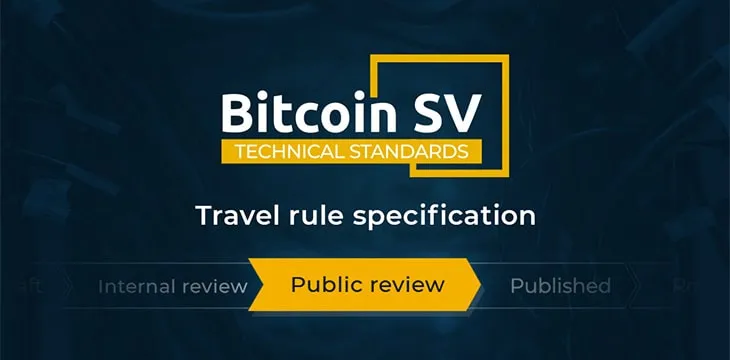|
Getting your Trinity Audio player ready...
|
The Bitcoin SV Technical Standards Committee (TSC), an industry-led standards organization for the Bitcoin SV ecosystem supported by Bitcoin Association, has opened its latest technical standard—the Travel Rule Specification—for public review.
The latest Travel Rule Specification covers FATF compliance and regulation. It applies to all Virtuals Asset Service Providers (VASPs).
The Travel Rule Specification, now available for public viewing, was authored by Angus Brown of Centbee. Before publication on December 14, it was reviewed by Bernhard Müller, Daniel Connolly, Delphine Forma, Marcin Zarakowski, Neil Samtani, and Sam Azad.
The specific purpose of the specification is to define a standardized protocol for VASPs on the BSV blockchain. They will be required to collect and exchange specific information under the Travel Rule.
The Travel Rule and the digital currency industry
- The rule was introduced by U.S. FinCEN in May 1996. It required that all financial institutions send the originator and beneficiary information with financial transactions of $3,000 or more.
- In June 2019, this was extended to Virtual Asset Services Providers (VASPs).
- In June 2020, the Financial Action Task Force (FATF) published a review and highlighted gaps in the implementation regarding VASPs. It also addressed stablecoins and unhosted wallets.
- This was followed in September 2020 by updated guidance on “red flag indicators” to help authorities and VASPs detect criminal activity. Further guidance was published in March 2021, drawing heavy criticism from the digital currency industry.
- In June 2021, a second review was published, which highlighted more gaps and pressed for implementation of the Travel Rule within the industry.
- In October 2021, FATF published a final version that brought DeFi into scope.
With this in mind, and with Bitcoin SV’s commitment to remaining legally compliant, the TSC published the protocol for public review. It acknowledged that “entities processing Bitcoin SV transactions need mechanisms to comply with the Travel Rule.” The publication of standardized methodologies is an attempt to make compliance easier.
The technical standard covers:
- Who VASPs are and what sort of activities they engage in.
- Who maintains “control or significant influence” within the definition.
- Various other questions such as whether peer-to-peer transactions, transactions within Dapps, or merchant payments are included.
- What VASPs must do in order to be legally compliant.
- Whether the rules apply to BSV tokens and stablecoins.
- What information should be collected, how it must flow, and to whom.
- At what value thresholds does the Travel Rule kick in.
- How VASPs should communicate and specifically what information they need to collect and send.
- All exceptions and exclusions that are out of scope.
You can view the Travel Rule specification here.
*The TSC’s purpose is to professionalize Bitcoin development to support global scaling and facilitate global adoption. It also aims to promote technical excellence and interoperability across the BSV ecosystem.
Read the latest ebook, BSV Blockchain as an Enterprise Cybersecurity Framework.

 04-22-2025
04-22-2025 





